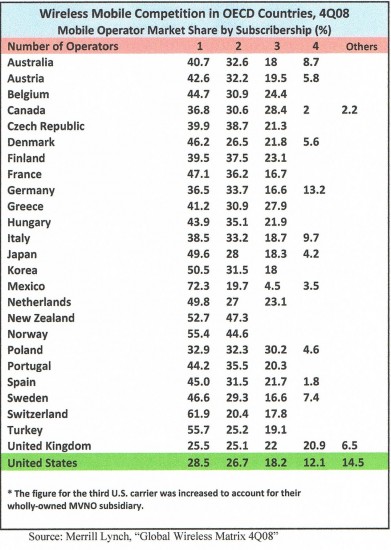FCC Chairman Julius Genachowski linked spectrum management, universal service and network neutrality in a speech yesterday at the Innovation Economy Conference in Washington, and in the process may have signaled some comprehension of the negative consequences network neutrality regulation may have.
His most significant statement was a concession that network management will be required to keep wireless networks and services economically sustainable. The FCC’s Notice of Proposed Rulemaking on network neutrality seeks to apply a “non-discrimination” principle to wireless—that is, to prohibit service providers such AT&T, Sprint, T-Mobile and Verizon Wireless from using network intelligence from grooming, partitioning or prioritizing data to ensure quality performance of voice, data, gaming or video applications.
Yet yesterday, as reported by Wireless Week, Genachowski acknowledged that the explosion of data use was placing “unsustainable strains” on operators’ wireless networks.
“[There] are real congestion and network management issues that operators must address, particularly around wireless networks, and we must allow reasonable network management…,” he said, emphasizing the importance of developing policies that “encourage investment and the development of successful business models.”
While the NPRM does allow for “reasonable network management,” it never really defines what that may be. In light of this, Genachowski’s injection of “investment” and “business models” into his side of the debate is both startling and welcome.
For one, it acknowledges the rising chorus of critics (examples here and here), who, independent of ideology, have questioned the economic wisdom of barring carriers from recouping their investment in intelligent network technology from large applications providers who generate these necessary costs. A recent conference on Capitol Hill, sponsored by the American Consumer Institute (full disclosure: I was a participant), featured comments a number of economists who said mandated non-discrimination was a recipe for higher consumer prices, lower quality and ultimately, declining investment in broadband infrastructure. Much of the Q&A discussion focused on whether numerous wireless data services and applications that have arisen out of innovations such as the iPhone, because of the continual network management they require, would be possible under a network neutrality regime.
Genachowski also deserves credit for tying the network neutrality issue in with spectrum management and universal service. Previous commissions have tended to pursue these issues separately, as if the policies addressing one had no effect on the others. Contemporary telecom policy must be holistic, understanding how spectrum allocation affects wireless network management, and how allowing the industry greater freedom to formulate the business models and partnerships can yield the investment needed to deliver universal service.


 The Technology Liberation Front is the tech policy blog dedicated to keeping politicians' hands off the 'net and everything else related to technology.
The Technology Liberation Front is the tech policy blog dedicated to keeping politicians' hands off the 'net and everything else related to technology.